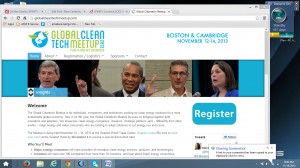
Clean tech meetup Boston 2013
Ordinarily, at business meetings,if you work in the kitchen, you stay in the kitchen.
But, on Tuesday, Nov. 12, in an unusual turn of event, following brief talks by Alicia Barton, CEO of the Massachusetts Clean Energy Center, and James Graham, clean tech dealmaker (yes, that’s really his title) at the UK Trade and Investment Agency in Boston, the chef in charge of food for an elegant reception at the Global Clean Tech Meetup 2013, took center stage. In explaining how his kitchen at the Boston Seaport Hotel is working toward sustainability, Chef Khaled Abi Issa said:
“At first it seemed like a difficult thing. But after you move past the resistance to change and the doubters and the initial up-front expenses….to our surprise, it seemed very much achievable.”
Chef Khaled and his team started with recyling, then began to collect food scraps for composting, he said. They then focused on building relationships with local and regional suppliers– farmers, bakers and cheese makers.
The kitchen now has its own herb garden, makes honey on the hotel campus, is increasingly using recycled containers, has eliminated styrofoam from the campus and has embarked on an initiative to reduce energy use in its storage areas.
“This is an ongoing process, it’s hard work and we are not there yet, but we feel good about our commitment, he said.
The “green kitchen”effort is part of an overall campaign by the hotel to operate in an “eco-friendly” manner, according to Katie Watson, conference manager at the Seaport Hotel World Trade Center.
As described on the Seaport Web site, the campaign, called “Seaport Saves” is dedicated to increasing sustainability and conservation. “It is possible to coexist in a delicate balance with the natural world while providing exceptional service in a luxurious setting.” the Website reads. (The hotel features “environmentally friendly guest rooms,’ local, farm to table organic dining options, green cleaning practices. It also offers complimentary electric vehicle charging stations; and bicycles and helmets for guests).
At the reception, I also spoke with:
- Howard Simansky, CEO of Cambridge-based media company 360 Chestnut and board member of SmartHomze, which he described as “the world’s first line of affordable, net-zero-energy homes.” Solar powered, all five sizes of Smarthomze use proprietary building systems and new materials to ensure lower costs, high quality, and a healthier environment, he said. I also met (among others):
- Jim Bowen, Boston-based Division Manager for International Renewable Energy at Vertex Engineering, who is working on a major solar site in Mexico City
- Chad Joshi, President and CEO of Altranex, a Toronto company with a waste-based biofuel to replace diesel–unusual in that it remains fluid in very cold temperatures
- Paul Laskow, of SaveEnergySystems in Somerville, which offers technology to help mid-sized companies measure and conserve their use of fuel.
BTW–In case you’re curious about the green kitchen’s menu: the beef, artichoke pasta, lamb, burger sliders, spinach pie, and pastries were delicious. I especially liked the chocolate-filled chocolate bonbons…and the Pinot. But, with apologies to the chef.the lentil burgers…not so much.
I wish I could have spent more time at the meetup–which included many high level speakers ( Masschusetts Governor Deval Patrick, Diarmuid O’Connell, VP of corporate and Business Development at Tesla Motors, for example) and companies from as far away as Norway and Israel. For more information, about the meetup, go to the conference website at https://meetup2013.pathable.com/#meetings.
As for the MassCEC: it began operating in 2009 with the goal of accelerating the growth of the Massachusetts clean energy industry. According to Catherine Williams, the CEC’s Senior Director for Communications, as the first agency of its kind in the US. , the Clean Energy Center:
(1) Provides financing and planning assistance to communities, businesses and residents seeking to adopt clean energy projects including solar, wind, biomass, water and organics-to-energy technologies.
(2) Works with clean energy businesses to grow their operations, provide training and workforce development, develop industry reports and sector analysis, and act as a connector across the clean energy ecosystem from academia and incubators to entrepreneurs and investors.
(3) Provides strategic and early-stage investments growing clean energy companies in order to promote the development of innovative technologies, leverage private capital and create jobs in the Commonwealth..
The Center is financed by the Renewable Energy Trust Fund, created by the Massachusetts Legislature in 1998 as part of the deregulation of the electric utility market. The trust is funded by a systems benefit charge paid by electric ratepayers of investor-owned utilities in Massachusetts, as well as municipal electric departments that have opted to participate in the program.
—Anita Harris
Anita Harris is a writer and consultant based in Cambridge MA. New Cambridge Observer is a publication of the Harris Communications Group,an award-winning PR & market development firm based in Kendall Square. HarrisCom specializes in outreach for health, science, technology and energy in the US and internationally.

